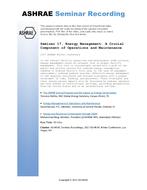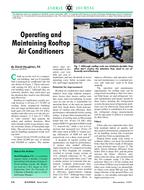This paper presents a comparison of three fault detection methods for air-handling units. The methods are:
- A qualitative method that compares controller outputs and model-based predictions.
- A rule-based method that examines measured temperatures and controller outputs.
- A model-based method that analyzes residuals based on steady-state models.
During a period of several months a number of faults were artificially introduced in an air-handling unit of an office building. By applying the fault detection methods to the field data and summing up successful detections of the faults as well as the false alarm ratios, the performance of the methods was assessed. The first method is easy to set up and generates few false alarms. On the other hand it detected only a few faults of those introduced. The second method is straightforwards and detected more faults. However, it requires some analysis during setup. The third method also detected more faults, but it aslo generated more false alarms. Moreover, this method demands considerable time for setup. It also requires some additional sensors.
None of the implemented faults were detected by modern building management systems used in the building.
Units: Dual
Citation: Symposium Papers, Atlantic City, 2002
Product Details
- Published:
- 2002
- Number of Pages:
- 18
- File Size:
- 1 file , 580 KB
- Product Code(s):
- D-7022


